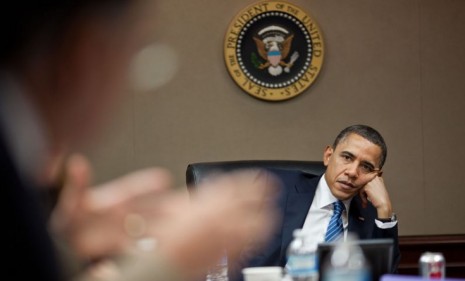Why isn't the U.S. doing more in Syria?
America is still sticking with simple diplomatic pressure, even as Syria's army escalates its violence against the opposition

A free daily email with the biggest news stories of the day – and the best features from TheWeek.com
You are now subscribed
Your newsletter sign-up was successful
As Syria escalates its deadly crackdown on pro-reform demonstrators, the Obama administration is clinging to hopes that it can use diplomatic pressure to help ease the crisis. The White House has stopped insisting that Syria's president, Bashar Al-Assad, is a reformer at heart, but it has yet to close the U.S. embassy in Damascus. President Obama is reportedly considering targeted sanctions against Assad and members of his regime. But has the time come to get tougher?
There is no excuse for going soft on Syria: "Even before the tanks rolled into Dara'a," says Ed Morrissey at Hot Air, "the idea that Assad was a 'reformer' was a patently ridiculous statement." He's buddies with Iran, and backs Hezbollah in Lebanon. Now it's clear his regime is at war with its own people. That was Obama's excuse for attacking Moammar Gadhafi in Libya — the least the president could do is demand that Assad leave power.
"Syrian dictator goes to war against ... Syria"
The Week
Escape your echo chamber. Get the facts behind the news, plus analysis from multiple perspectives.

Sign up for The Week's Free Newsletters
From our morning news briefing to a weekly Good News Newsletter, get the best of The Week delivered directly to your inbox.
From our morning news briefing to a weekly Good News Newsletter, get the best of The Week delivered directly to your inbox.
Military intervention is out of the question: Now is definitely the time to send a stronger signal that Assad will pay dearly — economically and diplomatically — if he continues to choose murder over reform, says The Economist. But "it would be folly for the West to intervene militarily in Syria." It "has a far more serious military than Libya's," and the democracy movement would vanish if it was seen as an invitation for attack by outsiders.
"The limits of humanitarianism"
Obama will do more, but it won't change anything: Obama moved slowly because he and his advisors doubted Syria's crisis would get this serious, says Josh Rogin at Foreign Policy, but "the administration now has no choice but to increase its involvement." The trouble is, "the United States does not have good relationships with either the government or the opposition, and lacks the leverage to affect events in the country."
"Inside the Obama team's 'shift' on Syria"
A free daily email with the biggest news stories of the day – and the best features from TheWeek.com
-
 Political cartoons for February 15
Political cartoons for February 15Cartoons Sunday's political cartoons include political ventriloquism, Europe in the middle, and more
-
 The broken water companies failing England and Wales
The broken water companies failing England and WalesExplainer With rising bills, deteriorating river health and a lack of investment, regulators face an uphill battle to stabilise the industry
-
 A thrilling foodie city in northern Japan
A thrilling foodie city in northern JapanThe Week Recommends The food scene here is ‘unspoilt’ and ‘fun’